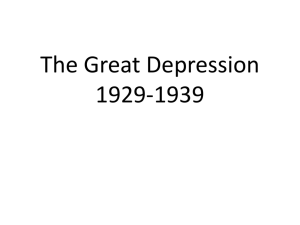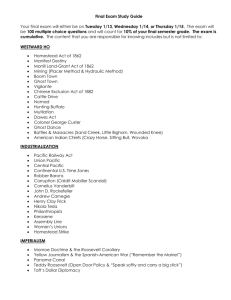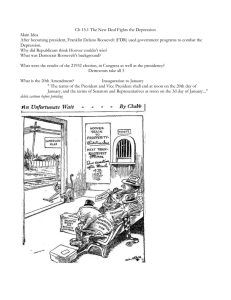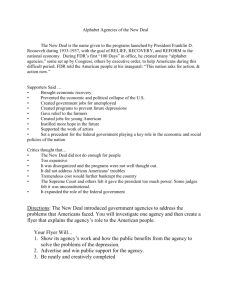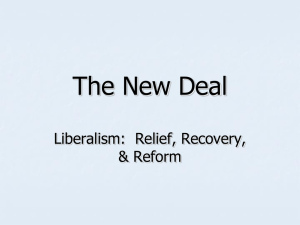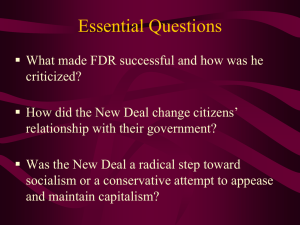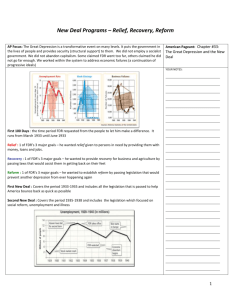Critics of the New Deal
advertisement
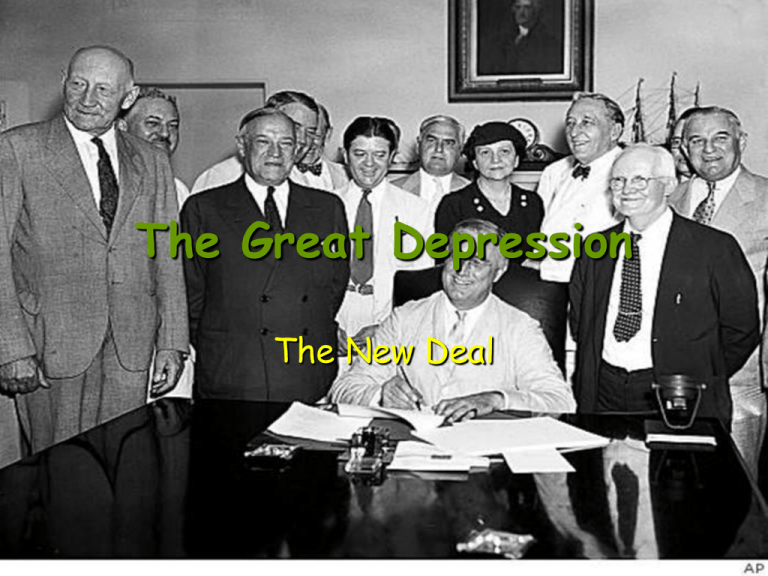
The Great Depression The New Deal Federal Emergency Relief Administration • 1933 • Sent millions of dollars to states to use in direct relief payments and food for the unemployed • Relief Civilian Conservation Corps (CCC) • 1933 • Created jobs for over two million young men in conservation work and parks • Relief Agriculture Adjustment Act (AAA) • 1933 • Paid farmers to reduce the amount of crops they planted, in order to cut excess production. • Recovery Federal Deposit Insurance Corporation (FDIC) • 1933 • Protected people’s bank deposits, thus eliminating the problem of “bank runs” that were a serious problem in the early 1930s. • Reform National Recovery Administration (NRA) • 1933 • Set up voluntary agreements among businesses to cut excess production. The agreements covered production, prices, wages, and hours of work • Recovery; Reform Tennessee Valley Authority (TVA) • 1933 • Built hydroelectric power plants and flood control dams in seven states in the Tennessee River region. • Recover; Relief Securities and Exchange Commission (SEC) • 1934 • Created to supervise the stock market and protect investors from dishonest practices. • Reform Public Works Administration & the Works Progress Administration (WPA) • 1935 • Created jobs for millions of unemployed people constructing roads, hospitals, post offices, parks, and many other projects. The WPA also included a program that hired out-of-work artists, photographers, actors, and writers for a wide range of artistic and educational projects. • Relief; Recovery National Labor Relations Act • 1935 • Gave labor unions the right to organize and represent workers in collective bargaining • Reform Social Security Act • 1935 • Created a federal system of old-age pensions and assistance for orphans and the disabled. It also created an unemployment insurance system. • Reform; Relief Fair Labor Standards Act • 1938 • Set up the first national minimum wage law and abolished child labor. • Reform Critics of the New Deal • Father Charles Coughlin – Detroit Priest who had a radio show that reached millions of listeners – criticized FDR for not being harder on big business – Also attacked bankers, Jews, communists, and labor unions Critics of the New Deal • Dr. Francis Townsend – Pushed for programs to help elderly Americans – Introduced the idea of a pension system for retired Americans – Influenced the creation of the Social Security Act Critics of the New Deal • Huey “Kingfish” Long – Louisiana Senator – Wanted FDR to redistribute wealth from the wealthy to the poor • Long developed the “Share Our Wealth Plan” • Heavily tax wealthy Americans and give every American a home and $2,500 a year • Motto- “Every man a king” – Support for Long began to grow • Was seen as a threat to FDR • Some people claimed he had dictator like characteristics – He was assassinated in 1935 Critics of the New Deal • Business Leaders accused FDR of spending too much money and trying to destroy the free enterprise system – Wanted the government to leave business alone and play a less active role in regulating the economy FDR and the Supreme Court • Many of Roosevelt’s New Deal programs were accused of being unconstitutional • The Supreme Court ruled that some of these programs were unconstitutional • FDR proposed increasing the number of justices on the Supreme Court – He would appoint 5 additional justices under this plan • People claimed FDR was trying to “pack” the court with justices who would support his plans • FDR’s plan was rejected The Impact of the New Deal on the Great Depression

